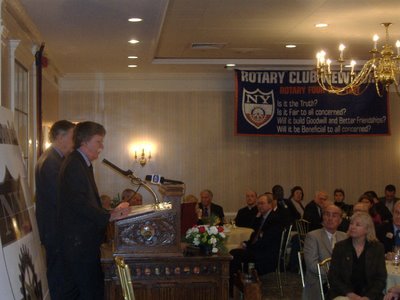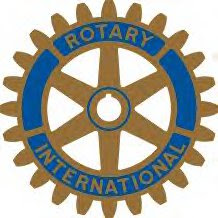 December 5 was the day when most of the nation’s editorial pages were either praising (Wall Street Journal) or condemning (The New York Times) United States Ambassador to the United Nation, John Bolton, on his one year tenure. Nevertheless, he was enthusiastically welcomed at the Rotary Club of New York when he graciously spent his lunch hour discussing the key priorities that the United States faces at the United Nations.
December 5 was the day when most of the nation’s editorial pages were either praising (Wall Street Journal) or condemning (The New York Times) United States Ambassador to the United Nation, John Bolton, on his one year tenure. Nevertheless, he was enthusiastically welcomed at the Rotary Club of New York when he graciously spent his lunch hour discussing the key priorities that the United States faces at the United Nations.The Ambassador emphasized that there is a full agenda at the UN, particularly at the Security Council. The most pressing problems are the deliverable nuclear weapons programs being developed by North Korea and Iran. In 1994, North Korea signed an agreement to stop its nuclear weapon development program in exchange for generous economic benefits. However, it is now being purported that North Korea has been clandestinely engaged in, and benefiting from, Iran’s nuclear program.
According to the Ambassador, North Korea sells ballistic missile technology and weapons to outlaw states. It also is earning foreign currency by counterfeiting U.S. currency, laundering illegal gambling revenue from Japan, and selling illegal drugs through diplomatic pouches. As a consequence, the UN Security Council passed Resolution 1695 (Demands suspension of all related ballistic missile activity;urges country to return immediately to Six-Party Talks without precondition) and it passed in July Resolution 1718 (Prevents Provision of Nuclear Technology, Large-Scale Weapons, Luxury Goods to Country; Permits Inspection of Cargo to Ensure Compliance) This is also designed to impede Kim Jong-il's ability to reward his subordinates, the Ambassador noted.
Perhaps more problematic is Iran. With its uranium mines, and uranium enrichment production facilities, Iran has mastered, or is very close to mastering, the nuclear fuel cycle and may already have an indigenous capability to develop nuclear weapons. For four years, the United States has been trying to convince European, Russian and Chinese leaders to stop Iran's nuclear weapon capabilities before they have full nuclear weapon capability. Security Council members have been willing to invite Iran to join the rest of the federalized world if they give up their pursuit of weapon-grade nuclear program. However, since there was no progress in these discussions, the Security Council passed a resolution for Iran to cease its uranium enrichment program by last August 31.
Many member-states at the UN are frustrated by continuing the diplomatic route for too long, and sanctions are now being considered. It will be a test of the Security Council if it will take this issue seriously. If it does not, the US will need to consider alternate means to stop nuclear-weapon capability in Iran, Ambassador Bolton averred.
Another area of concern is the influence of Hezbollah relative to the democratically elected government of Lebanon. The Ambassador stated that Syria is encouraging the Lebanese governments to concede power to Hezbollah. Close to 25% of Lebanon’s population has demonstrated in the streets in support of Hezbollah, but political parties should not have their own militia, the Ambassador emphasized. If the democratically elected government does not survive, Hezbollah will acquire control of Lebanon's governmental assets and military. Consequently, Syria and Iran will be very influential with Hezbollah and then there will be a "terrorist" state in the Middle-East.
Another point is that the government of Sudan is still resisting UN Peace-Keeping force to stop gross violations of human rights, starvation and murder in Darfur, he noted.
 During the Q&A section, Ambassador Bolton did acknowledge that the United Nations is and has been successful in a number of areas, but he advised, as Paul Volker did in last year’s UN Reform Report, the UN has to be sure that it does not get lost in a "Culture of Inaction"”.
During the Q&A section, Ambassador Bolton did acknowledge that the United Nations is and has been successful in a number of areas, but he advised, as Paul Volker did in last year’s UN Reform Report, the UN has to be sure that it does not get lost in a "Culture of Inaction"”.









